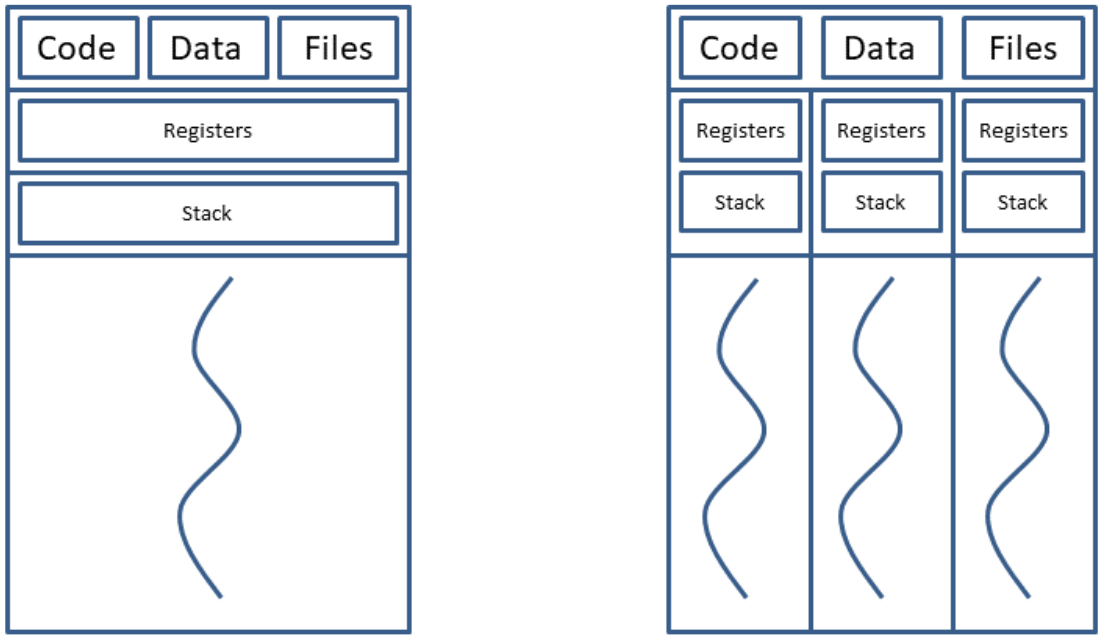4. Threads
11/10/22
OS perspective
- A process consists of two fundamental units
- Resources: All related resources are grouped together
- Execution trace: an entity that gets executed
- A process can share its resources between multiple execution traces/threads

Single threaded process(left), multi-threaded process(Right)
Every thread has its own execution context (program counter, stack registers)
All threads have access to the process shared resources. Global variables, memory etc
The execution of a process has states. States and transitions (new, running, blocked, ready, terminated). Multiple threads can be in different states. They relate to the process of the execution
Every thread has a thread control block
Threads incur less overhead to create/terminate/switch. They have shared resources (address space etc)
Hyper threaded cores have hardware support for multi-threading. Don't need to save each thread when switching
Threading is easier than having multiple processes. Due to threads sharing the same physical memory address, can interact with one another.
Inter-thread communication: Easier/faster than interprocess communication (memory is shared)
No protection boundaries: Required in the address space )threads are cooperating, belong to the same user, and have a common goal
Synchronisation: Has to be considered carefully
Why use threads
- Multiple related activities apply to the same resources, these resources should be accessible/shared
- Processes will often contain multiple blocking tasks
- IO operations
- Memory access: page faults
- Such activities should be carried out in parallel/concurrently
- Application examples: webservers, make program etc interprocess
- Benefit of using threads rather than putting everything sequential has to do with blocking system calls. Can do save whilst reading in user input instead of skipping it
User Threads
Many-to-One
- Thread management (creating, destroying, scheduling, thread control block manipulation) is carried out in user space with the help of a user library
- The process maintains a thread table managed by the runtime system without the kernels knowledge.
- Application itself and the library that you're using is responsible for implementing the practice completely.
- Kernel can see 1 process, but user space can see multiple threads
- Advantages:
- Threads are in user space (cannot switch to kernel space)
- Full control over the thread scheduler
- OS independent (run on OS that doesn't support it)
- Disadvantages:
- Blocking system calls suspend the entire process (user threads are mapped onto a single process, managed by the kernel)
- No true parallelism (process is scheduled on a single CPU)
- Clock interrupts are non-existent (non-preemptive)
- Page faults result in blocking the process
Kernel Threads
One-to-One
- The kernel manages threads - user applications access threading through system calls
- Thread table is maintained by the kernel
- If a thread blocks, the kernel chooses thread from same or different process
- Advantages:
- True parallelism can be achieved
- No run-time needed
- Frequent mode switches take place
- Scheduling of kernel threads is all done by the OS
Performance
- Null fork: the overhead is creating, scheduling, running and terminating a null process/thread
- Signal wait: overhead is synchronising threads
Hybrid Implementations
- User threads are multiplexed onto kernel threads
- Kernel sees and schedules the kernel threads
- User application sees user threads and creates/schedules these
- Implements best of both worlds.
Thread Management
- Thread libraries provide an API/interface for managing threads
- Thread libraries can be implemented:
- Entirely in user space
- Based on system calls
- Examples of thread APIs include POSIX's PThreads, Windows Threads, and Java threads
- API - table of contents which tells you what functions can be executed. Can be executed as user or kernel threads. Linux will create kernel threads.
POSIX Threads
- POSIX threads are a specification that anyone can implement.
- Core functions of PThreads:
| Function Call | Summary |
|---|---|
pthread_create | Create new thread |
pthread_exit | Exit existing thread |
pthread_join | Wait for thread with ID |
pthread_yield | Release CPU |
pthread_attr_init | Thread attributes (priority) |
pthread_attr_destory | Release attributes |